|
|
|
Sort Order |
|
|
|
Items / Page
|
|
|
|
|
|
|
| Srl | Item |
| 1 |
ID:
142727
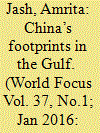

|
|
|
|
|
| Summary/Abstract |
With the turn of the twenty-first century, the most characteristic feature that dominates international politics and economics is the ‘rise of China’. With its booming economy, the biggest challenge faced by China is securing its increasing energy needs that are crucial to sustain the economic growth and stability. That is, energy security is directly related to economic security. In traditional understanding, economic security is concerned with ‘the degree to which national security is threatened by dependence on external sources of technology, raw materials, food and fuel’. And in this perspective, energy security is about the demand and supply of energy resources. In a broader understanding, Belgrave ET. Al. define energy security as:
|
|
|
|
|
|
|
|
|
|
|
|
|
|
|
|
| 2 |
ID:
142726
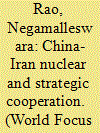

|
|
|
|
|
| Summary/Abstract |
Elevation of China-Iran nuclear cooperation is a factor which pushed both countries’ willingness to improve strategic and military cooperation. Iran’s nuclear programme can be traced to the Shah’s rule, in the initial years of the Islamic Republic. At this time Iran had made significant advances in nuclear technology. Eventually Iran focussed on nuclear technology and this caused Iran to seek help from China. In fact, Iraq was also trying to develop nuclear weapons at that time. Hence Iran had sought help from nuclear advanced countries along with India for building a research reactor, while this was utilised effectively by China and provided other assistance in nuclear research. The Iran-Iraq conflict was one of the reasons behind Iran’s ambition to become a nuclear power and to be independent in enriching uranium. China helped Iran’s nuclear programme in return for benefits relating to access to Iran’s energy resources. China had, along with Russia, assisted Iran’s nuclear programme for peaceful use of nuclear energy and also provided it with material and training support. However dual use technology transferred from China to Iran may have been used for nuclear weapons technology.
|
|
|
|
|
|
|
|
|
|
|
|
|
|
|
|
| 3 |
ID:
142718
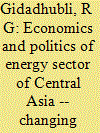

|
|
|
|
|
| Summary/Abstract |
Central Asia is one of the energy resource rich regions in the world. For the post-Soviet sovereign and independent Central Asian States (CAS), energy sector has assumed special political and economic significance during the last two decades. The leadership of the CAS has to deal with the geo-political influence of the global powers apart from the fact that their energy sector, being integrated with the global energy market, has also to deal with the cost and benefit of fluctuating international demand and price for oil.
|
|
|
|
|
|
|
|
|
|
|
|
|
|
|
|
| 4 |
ID:
142721


|
|
|
|
|
| Summary/Abstract |
The Caspian Sea region is one of the oldest oil-producing areas in the world and is an increasingly important source of global energy production. The area has significant oil and natural gas reserves from both offshore deposits in the Caspian Sea itself and onshore fields in the Caspian basin. Traditionally an oil-producing area, the Caspian area's importance as a natural gas producer is growing quickly. Aside from Azerbaijan's oil production, the Caspian Sea largely was untapped until the collapse of the Soviet Union. With several newly independent countries gaining access to valuable hydrocarbon deposits, the different countries have taken diverging approaches to developing the energy resources of the area.
|
|
|
|
|
|
|
|
|
|
|
|
|
|
|
|
| 5 |
ID:
142732
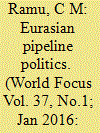

|
|
|
|
|
| Summary/Abstract |
The prolonged turmoil in Syria has several overtones, interpreted through varying dimensions that are mutually overlapping – but also disparate. What is often less discussed is the relevance of pipeline geopolitics, in conflagrating a conflict that sparked up as a mere civil war, just like any other anti-establishment protest across the rest of the Arab world. Notably, the argument over two major proposed pipeline projects is reflected in the continuing carnage engulfing Syria. These are the proposed Iran-Iraq-Syria gas pipeline and the Qatar-Saudi Arabia-Jordan-Syria gas pipeline respectively. The former is often called the Islamic Pipeline.
|
|
|
|
|
|
|
|
|
|
|
|
|
|
|
|
| 6 |
ID:
142729


|
|
|
|
|
| Summary/Abstract |
Energy Security is an important concern of India in enhancing India’s relation with Central Asia. The importance that India now attaches to energy security is reflected in the former Prime minister of India Dr.Manmohan Singh’s remarks in an interview with financial times in 2009 stating, that the Energy security is second only in our scheme of things to food security. The study of rising demands of energy and disparity between production and consumption of energy are chief objectives of this paper. The paper further elaborated on the option of energy security for India in CARs. The objectives have been studied by relying on the primary and secondary sources of data both offline and online sources. Governmental as well as Institutional records, surveys and documents were used for this study. The reports and projects of various agencies and scholars are also important sources of data for this study.
|
|
|
|
|
|
|
|
|
|
|
|
|
|
|
|
| 7 |
ID:
142725


|
|
|
|
|
| Summary/Abstract |
The Central Asia had been the centre stage of imperial rivalry between Britain and Russia during the nineteenth century. Though changed in its dimension, the centrality of Central Asia did not diminish even inthe era of New Great Game. The geopolitical realities of the region changed with disintegration of Soviet Unionas well as with the emergence of fiveCentral Asian states, Kazakhstan, Kyrgyzstan, Tajikistan, Turkmenistan and Uzbekistanin the world politics. There are three factors which bring significance to the Central Asian states in theInternational Politics. Geographical location of the region is the first factor which has accrued significance to the region. It is a landlocked area with no access to the Oceans, and thus it needs welldeveloped land routes to access other countries. The second factor is its closeness to the important world powers such as Russia and China. And thirdly these States are rich inenergy resources such as natural gas and oil which gives it an important position in the issues of world politics. All these factors play a significant role indirecting the new phase of the Great Game towards Central Asia.
|
|
|
|
|
|
|
|
|
|
|
|
|
|
|
|
| 8 |
ID:
142723
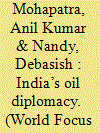

|
|
|
|
|
| Summary/Abstract |
In the era of globalisation, among so many other things, closeness and cooperation between and among states in the economic field has been one of the significant developments. Of course, it might have put some adverse impact or effect on some weak economies vis-a-vis strong ones but a complete independent and isolationist policy in so far as the economic aspect of globalisation is concerned would be neither pragmatic nor desirable. Especially the developments following the disintegration of the former USSR in early 1990s paved the way for increasing economic cooperation across the globe. The imperatives of economic cooperation had even urged the People’s Republic of China to forgo its earlier adherence to the model of closed economy. In a similar fashion, India had to abandon its Non-Aligned hangover and state-led economy that led to a grave fiscal situation which threatened to ‘bankrupt the federal exchequer’ (Ganguly et al., 2011: 13) towards the end of 1980s.
|
|
|
|
|
|
|
|
|
|
|
|
|
|
|
|
| 9 |
ID:
142705
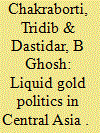

|
|
|
| 10 |
ID:
142724


|
|
|
|
|
| Summary/Abstract |
The prevailing global political or economic order is still characterised by an assertive dominance of powerful nations over weak or less powerful ones. The powerful nations always try to grab the maximum of economic benefits even if it is unjust or unethical and is also detrimental to the interests of the weaker counterparts despite their bitter resistance. If physical and military means were the only route for establishing this dominance in the early years, a mix of political, economic and trade diplomacy became the modern means for achieving the above objective with varying degrees of enforcement and resistance in different regions and situations. Today, in the largely multipolar world of politics and multilateral markets, there have often been clashes of interests and, thereby, the military has once again become an active agent of arbitration, where markets and diplomacy fails.
|
|
|
|
|
|
|
|
|
|
|
|
|
|
|
|
| 11 |
ID:
142728


|
|
|
|
|
| Summary/Abstract |
Oil and Geopolitics are entwined. No other natural resource is more pertinent in shaping global geopolitics as Oil has been, and no any other region has been more instrumental in shaping geopolitical great game for oil as the West Asia has been. Despite the fact that the region constantly remains to be politically volatile, the global oil supply remains to be highly dependent on West Asia, and if various projections are to be believed the region would continue to dominate the global oil production in the foreseeable future. West Asia holds central place in Spykman’s schema of Rimland and subsequent American policies. During the Cold War period West Asia remained to be one of the major chessboards for the great game being played between the USA and Soviet Union. Although post-Cold War nature of oil geopolitics has become more complicated, its significance for major state and non-state actors has magnified than dwindled.
|
|
|
|
|
|
|
|
|
|
|
|
|
|
|
|
| 12 |
ID:
142717


|
|
|
|
|
| Summary/Abstract |
Energy resources are reshaping the geopolitical map in Eurasia. Eventual control of the development of oil deposits as well as the eventual pipeline routing will determine the political and economic future of Russia, Turkey and the Central Asian states; it will determine Iran’s position in the region and its relations with the West; it will determine the realignment of the strategic triangle among the US, Russia and China; and it will have strategic consequences by lessening dependence on Persian Gulf oil. The absence of a robust security bulwark and deep rooted intra-regional conflicts raises concerns about the viability of regional security in West Asia. Now importance arises that whether India should start getting involved in the regional security of West Asia by helping create a regional security bulwark which may deter the outside interference in the region or not. We must remember that, the region forms a part of India's extended neighbourhood.
|
|
|
|
|
|
|
|
|
|
|
|
|
|
|
|
| 13 |
ID:
142731


|
|
|
|
|
| Summary/Abstract |
Energy is sine qua non for development of a country irrespective of the situation that they are placed in the larger milieu of development. It is the most sought after entity across continents and will continue to play determinant role in international politics and international relation. Over the last few decades it has developed potentials to dictate the world order and has designed and redesigned the world order. It has fast become a turf and a battle ground not only for major powers of the world but also for oil possessing countries as well as for non-state actors. It is fundamental to socio-economic and technological development of the nation state. In the fast globalising and increasingly competitive world, it has come to occupy front-stage in world politics.Contemporary multi-polar worldwhich is characterised by competition for resources, energy security (both the access and flow of it) is among the most pressing issues in global politics.
|
|
|
|
|
|
|
|
|
|
|
|
|
|
|
|
| 14 |
ID:
142719
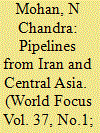

|
|
|
|
|
| Summary/Abstract |
For India’s energy security, the good news is the continuing weakness in global crude prices as it imports 80 per cent of its requirements. As the world’s fastest growing economy, it has burgeoning requirements for oil and gas from West, Central Asia and elsewhere, as domestic production has sharply declined. Brent crude prices have averaged $53 a barrel in 2015 and will be at the same levels in 2016 as well. Although the NDA government has not fully passed on the benefit of cheaper crude to consumers at the pump it must ensure supplies of cheap oil and gas for the Indian economy.
|
|
|
|
|
|
|
|
|
|
|
|
|
|
|
|
| 15 |
ID:
142722


|
|
|
|
|
| Summary/Abstract |
Oil has emerged as the most potent weapon within the global economy and has increasingly been instrumental in designing the world politics and international relations. Its potentials have also shaped in terms of magnitude and scale so much so that it is fast becoming a strong determinant of world order. Oil ceases to be mere economics and commerce and a source of energy; rather it has assumed a multi-dimensional role in the wider milieu of international politics and international relations. Oil is one of the strong determinants of the value of Dollar in international market, alongside the arms and narcotics trade. It is quite ironical that oil constitutes the biggest sector of economy, and is the most important factor for crime, at local, national and international level. It is indeed one of the factors that have worsened the relations among nations and contributed toward political instability within states.
|
|
|
|
|
|
|
|
|
|
|
|
|
|
|
|
| 16 |
ID:
142730
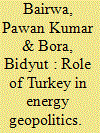

|
|
|
|
|
| Summary/Abstract |
Energy affects almost all aspects of life and enormously contribute in economic, social and political development, which is sustainable as well. Energy, in this way, by ensuring socio-economic development augments the well-being of people and at the same time gives political leverage uplifting the country's position in the international realm. The present world is changing at a very fast rate and there is growing demand for hydrocarbon energy for the speedy development of the nations. Consequently, it can be said that the forthcoming decades will probably bring about significant modifications in the global energy scenario. Therefore, there is requirement to change the strategic orientation related to new concepts of energy and their implications.
|
|
|
|
|
|
|
|
|
|
|
|
|
|
|
|
| 17 |
ID:
142720
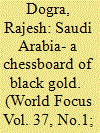

|
|
|
|
|
| Summary/Abstract |
Oil and natural gas are parts of fossil fuels and scientists believe that they were formed by organisms-animals and plants-that died, decomposed, and converted into solid rock thousands, may be millions, of years ago as a result of eminent level of heating. That natural process took place under the earth and resulted in what is today called petroleum, a finite mixture of hydrocarbon molecules that is not easily expendable. Oil and natural gas have high net energy and outside the fact that one is a fluid and other is vaporous at surface condition, their only difference relates to the level of the heating the rocks persisted and their molecular weight.
|
|
|
|
|
|
|
|
|
|
|
|
|
|
|
|
|
|
|
|
|